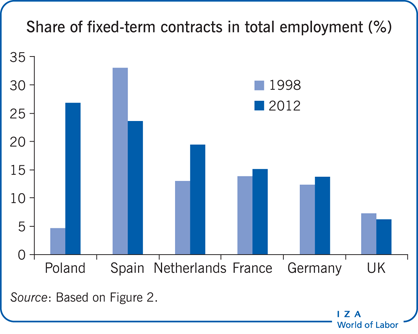Elevator pitch
Fixed-term contracts have become a major form of employment in Europe. Available evidence about whether temporary jobs are a stepping stone to a permanent employment or are a dead end is mixed. The usefulness of these jobs depends on the institutional and economic environment. Fixed-term contracts can be a pathway from unemployment to employment, but their potential as a stepping stone to permanent employment is undercut if there is a strong degree of segmentation in labor markets. If that is the case, the labor flexibility motive of employers ends up dominating the screening function in offering a fixed-term contract.

Key findings
Pros
Introducing fixed-term contracts can create additional job opportunities for labor market entrants and reduce unemployment.
Fixed-term contracts allow for the screening of workers in the context of strict dismissal protection.
Under specific conditions, fixed-term contracts can be effective stepping stones to permanent employment.
Fixed-term contracts are most effective in paving the way to stable employment if combined with training.
Cons
In a system with strict employment protection for open-ended contracts, the liberalization of fixed-term contracts can lead to a severe dualization of the labor market. A dual labor market effectively reduces employers’ willingness to hire on a permanent basis.
Fixed-term contracts can be associated with low productivity jobs and a significant wage gap
In severely segmented labor markets, fixed-term contracts tend to be associated with alternating periods of temporary employment and phases of unemployment.